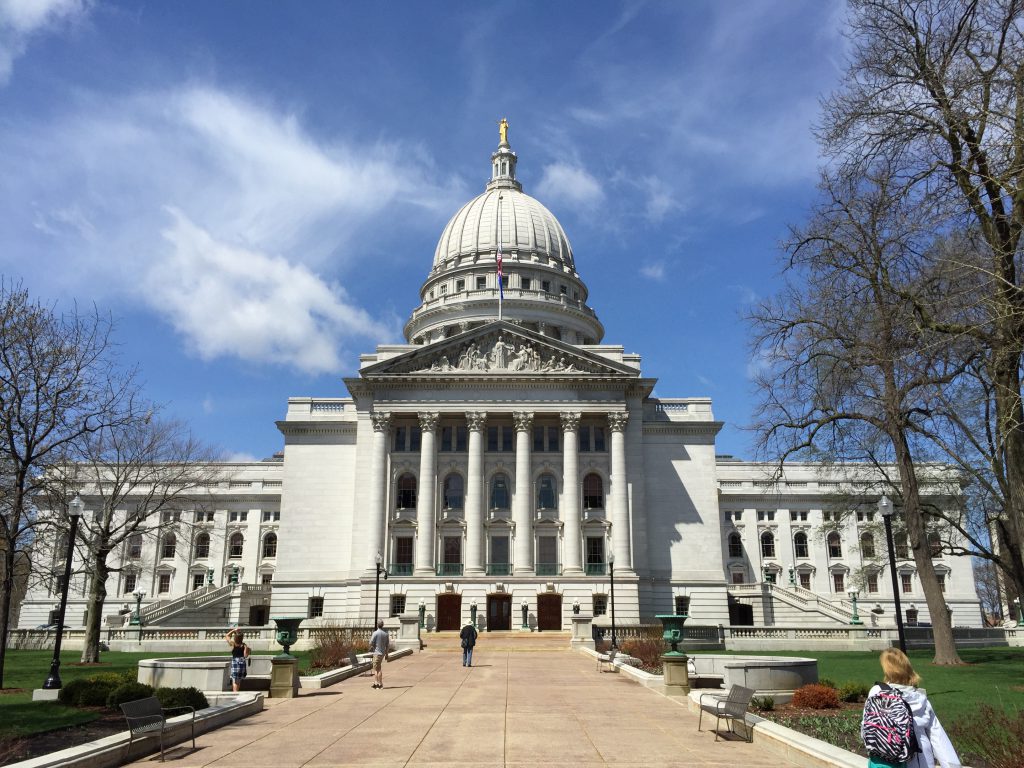Fight Over $5 Billon in Federal Aid
Republican Legislature's bill gives it oversight over federal stimulus money. Evers intends to veto it.
Every 10 years in this century, the federal government has given Wisconsin state government more than $5 billion to help recover from a national crisis.
Wisconsin, for example, got $5.1 billion in emergency federal aid in 2009-10 to help rebound from the Great Recession. And, when the state government gets its next shot of federal aid to recover from the COVID-19 pandemic, the total from Washington will then have totaled more than $5 billion.
This year’s debate over how to spend the next chunk of COVID-19 federal cash — $3.2 billion for state government from the Biden stimulus plan — will differ in two important ways from 2009-10. First, Wisconsin won’t repeat what it did in 2010: Return $810 million in federal stimulus cash to Washington — money that was dedicated to starting high-speed passenger train service between Milwaukee and Madison. Second, this year Republican legislators want oversight over how Democratic Gov. Tony Evers spends the additional $3.2 billion that will be soon coming from Washington.
Republicans, who control the Legislature, had no say in how Evers spent $2 billion in federal pandemic relief last year. “Oversight of tax dollars is an essential function of the legislative branch,” said Senate Majority Leader Devin LeMahieu. “Without it, we risk losing important considerations that come from elected representatives and residents from around the state.”
“Billions of taxpayer dollars should not be in the hands of a single person,” added Assembly Speaker Robin Vos. “We’re simply asking that the governor include others in the decision-making process.”
But an Evers aide said the Republicans’ oversight bill will be vetoed, since legislators refused to work with the governor on fighting the pandemic for eight months last year.
A Legislative Fiscal Bureau (LFB) report summarized how $5.1 billion in 2009-10 federal aid was spent to recover from the Great Recession — spending approved by then-Democratic Gov. Jim Doyle and Democrats who then controlled the Legislature.
Doyle said 2009-10 was the “worst economic time since the Depression” of the 1930s, caused by the meltdown of Wall Street financial giants who had bet too heavily on subprime mortgages and easy credit. Consumers, many of whom had lost their jobs and owed more on their homes than they were worth, stopped buying back then. And they stopped buying again last year after “stay home, don’t travel” warnings caused by COVID-19.
Federal stimulus aid is “really designed to get people back to work right now,” Doyle said. In 2009-10, Doyle said he made sure Wisconsin had a list of “shovel ready” projects that could quickly be started with the $5.1 billion from Washington.
One of the most expensive projects Doyle lined up was high-speed train service between Milwaukee and Madison. State government purchased Talgo train sets for the Milwaukee-Madison route, but defaulted on that contract in 2012 after then-Republican Gov. Scott Walker returned the $810 million for the train back to Washington. In 2015, state government paid Talgo $50 million to settle a lawsuit whereby Talgo kept the train sets.
The LFB’s report said the most expensive programs paid for with economic stimulus cash from Washington in 2009-10 were $1.2 billion on health-care programs, including Medicaid that cares for the poor, elderly and disabled and SeniorCare that helps elderly pay for prescriptions; on K-12 school aids, $1.1 billion, and on state and local highways, $529 million.
Without that federal aid, Doyle said, “20% of Wisconsin’s teachers could have been laid off.”
Doyle questioned whether Evers and Republican lawmakers can negotiate a way for legislators to have oversight over the next $3.2 million in federal stimulus aid. “A lot of this is an executive [branch] function that needs to get done — and get done quickly,” Doyle said.
Steven Walters has covered the Capitol since 1988. Contact him at stevenscotwalters@gmail.com
If you think stories like this are important, become a member of Urban Milwaukee and help support real, independent journalism. Plus you get some cool added benefits.
The State of Politics
-
RNC Brings Fame to Gen Z Party Leader
 Jul 15th, 2024 by Steven Walters
Jul 15th, 2024 by Steven Walters
-
Wisconsin’s Republican Roots Run Deep
 Jul 8th, 2024 by Steven Walters
Jul 8th, 2024 by Steven Walters
-
Feuding Supreme Court Justices Need a Break
 Jul 1st, 2024 by Steven Walters
Jul 1st, 2024 by Steven Walters























Given their recent history, I’m certain our Republican legislators most pressing concern is in finding ways to direct as much recovery money as possible into the coffers of their wealthy patrons. Anything to lower the burdensome taxes of the Menards and Hendricks of the state. Gerrymandering continues to permit so many great opportunities for the richly deserving.